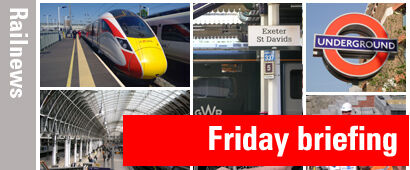Minister refuses to confirm eastern leg of HS2
HS2 minister Andrew Stephenson has refused to be drawn on the fate of the eastern leg of HS2, which is planned to connect the West Midlands, East Midlands and Yorkshire, with a terminus at Leeds. There has been lively speculation for several months that this part of the high speed project is set to be placed on hold and even abandoned, but the government has neither confirmed nor denied the rumours. A further opportunity to discover the truth came yesterday during questions in the House of Commons. when shadow transport minister Tanmanjeet Singh Dhesi said: 'When reports surfaced over the summer that Ministers planned to mothball the eastern leg, I was absolutely shocked. A U-turn, Mr Speaker? Another broken promise from this government? Surely not. Being the helpful person that I am, I want to help the government put this scandalous rumour to bed once and for all. Can the Minister, rather than giving the evasive answer that he gave me last year, confirm that the eastern leg of HS2 will be built in full, on time and on budget?' Mr Stephenson replied: 'As the Prime Minister announced, we are working on the integrated rail plan, which is progressing well. It is only right that Ministers take time to fully consider all the evidence fromall the stakeholders, regional leaders, the National Infrastructure Commission and the government’s own analysis before making a decision. This is a cross-government decision, but we intend to publish the integrated rail plan soon.' Meanwhile, a petition calling for HS2 to be abandoned entirely which has attracted more than 155,000 signatures will be debated in Parliament on Monday.
Rail Delivery Group warns of 'double whammy' unless commuters return
The Rail Delivery Group has published new research which suggests that city centres and high streets could be hit by a 'double whammy' of congested roads and business closures if there is a significant long-term reduction in commuting by train. The latest figures from the industry show that commuting by rail is at just a third of pre-pandemic levels. This is expected to increase this month but could take years to return to numbers seen in 2019. However, car journeys are recovering much more quickly. Government data shows that the number of car journeys has almost reached pre-pandemic levels, at around 96 per cent, but the number of people taking train trips is still lagging behind, at around 60 per cent. The research, by WPI Economics for the RDG, shows the extent to which city centre coffee shops, pubs and retailers could also suffer if rail commuting doesn’t pick up. Commuters travelling into city centres by train support local businesses by spending, on average, £12 on food and drink, £8 on shopping and £6 on entertainment and culture on each journey. Before the pandemic, this expenditure totalled £30 billion a year. The RDG added that although commuting and business journeys by rail are still well below pre-pandemic levels, leisure journeys are recovering more quickly, suggesting that many people feel confident travelling by train.
Engineers worked flat out to repair cable damage
Train services were disrupted between Birmingham New Street and Lichfield Trent Valley after overhead power cables were damaged on the northern section of the Cross City line. Network Rail apologised to passengers yesterday afternoon as its engineers worked flat out to repair the 25,000-volt cables at Gravelly Hill. Around 1.7km of electric cable was damaged. The cause has not been revealed, but the scale of the repairs meant trains couldn't run on the line for the rest of the day. Services have now returned to normal.


